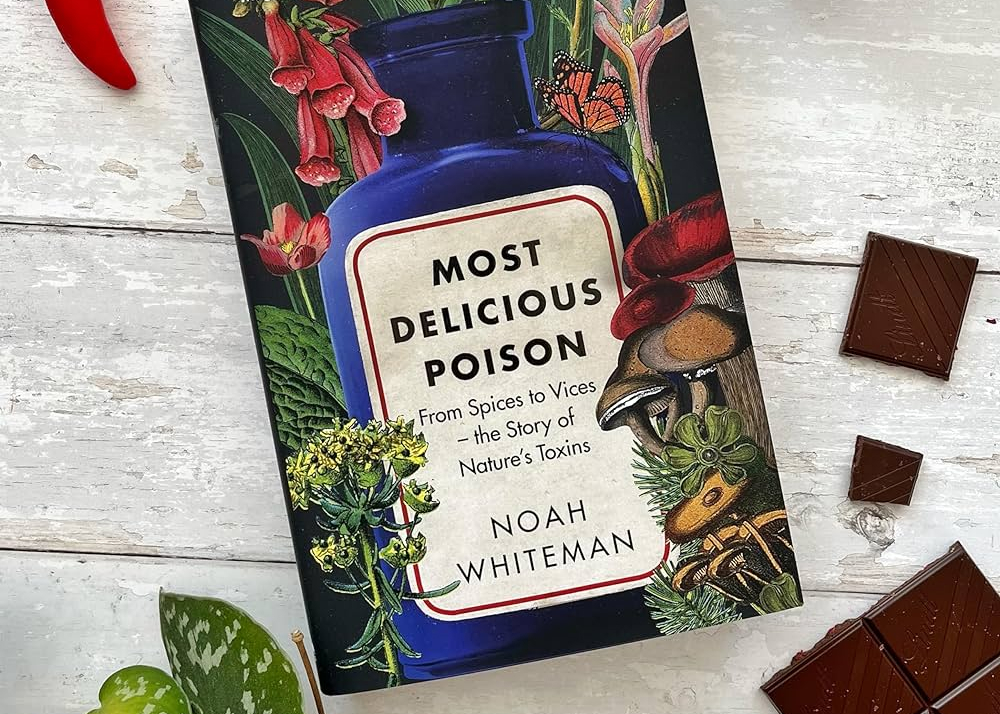"The Reign of Toxins: Unveiling the Allure of 'Most Delicious Poison'"

Noah Whiteman's Most Delicious Poison, published by Little, Brown Spark and priced at $30, is a compelling look at nature's toxins. This work of Whiteman was prompted by the sudden death of his father from alcohol use disorder in 2017. Trying to understand the impact of toxins on humans, he conducted a widespread examination culminating in his maiden book, Most Delicious Poison: The Story of Nature’s Toxins — From Spices to Vices.
When it comes to origins of toxins, the book tackles everything from chemistry to evolution, even unearthing instances in world history where humans have manipulated natural toxins for varied uses such as medicines, spices, and pesticides. Whiteman reveals that the toxins present in nature are the core element and that we have unknowingly tapped into an ongoing natural war, exploiting its resources.
Natural warfare, as described by Charles Darwin, is the relentless evolution of defenses and offenses amongst plants and animals. Many of the compounds used for medicinal purposes or stocked in our homes originally served as defenses for plants against pests, as Whiteman highlights. Our neurological similarity with insects grants these chemicals power over our minds and bodies.
As a researcher of insect adaptation to plant toxins, Whiteman adeptly steers readers through a world filled with potential poisons and cures, heavily populated by plant derivatives. He discusses a few toxin types in each chapter, extensively explaining their sources, chemical workings, and their historical significance in human usage.
One example is tannins, a compound found in plants like oaks, tea shrubs, and grapevines. Tannins are believed to protect plants by obstructing the nutrient absorption of microbes and herbivores. They also bond with saliva proteins and are responsible for the dry, coarse sensation enjoyed while drinking Cabernet Sauvignon. Tannins have long been used in tanning animal skins for leather, and tannin-rich oak gall ink was prominently used in drafting crucial documents like the Magna Carta and the Declaration of Independence.
Our pantries and medicine cabinets exemplify the significance of toxins in human life. Whiteman emphasizes on toxins used in pharmacology, pointing out how the antimalarial drug quinine and aspirin were derived from natural sources. Several alkaloids like curare, cocaine, and scopolamine have been transformed into anesthetics. He also pays tribute to the indigenous communities around the world, who’ve often been exploited for their medicinal knowledge without any compensation.
Whiteman also takes note of the growing regulation on the exploitation of natural products, with many countries passing strict biopiracy laws. The book ends by discussing how historical obsession over spices triggered centuries of geopolitical chaos, the East India Company's establishment, and the Opium Wars, among numerous other events. Accordingly, the ensuing consequences entailed Indigenous rights violation, the climate crisis, and a global decline in biodiversity.
The impact of toxins, such as those leading to the opioid epidemic and alcohol use disorder, is a repeated theme in the book. Whiteman underlines a thin line between healing and harm when toxins come into the picture. His personal experiences litter the narrative, especially the ones involving his father, reflecting a poignant mix of grief and science. “My attempt to grasp why [my father] died allowed me to identify and then draw together the many ways that nature’s toxins affect the world.”
Most Delicious Poison is a thoroughly researched and highly personal account that captures a wide audience. Building on an engaging premise that the experience of nature's toxins is inherently human, it's a thought-provoking read best enjoyed with a cup of herbal tea and a few drops of lavender oil in a diffuser.
Buy Most Delicious Poison from Bookshop.org. Science News is a Bookshop.org affiliate and will earn a commission on purchases made from links in this article.




